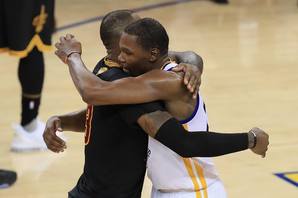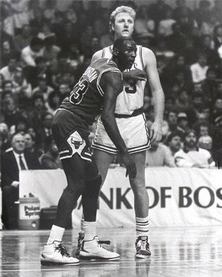
by Erik Ritland
On cowardice and the lust for success, the cheapness of manufactured success, the two key differences between the 2017 Golden State Warriors and the 1996 Chicago Bulls, what greatness means, and what the tainted legacy of the '17 Warriors means for the future of the NBA
Manufactured for greatness
Unfortunately for sports fans, the Golden State Warriors made easy work of the Cleveland Cavaliers in the 2017 NBA Finals. This has caused a lot of people, from casual fans to sports commentators who should know better, to wonder whether the Warriors are the greatest team of all-time.
Well, they might be. They’re definitely in the conversation. But their story includes a glaring asterisks, one that will be clear whenever their story is told.
The 2017 Golden State Warriors were put together like no team in sports history. We all know the story: already stacked with two of the best players in the game in Steph Curry and Klay Thomspon, free agent Kevin Durant chose to join them in the offseason. He did this because he hadn’t won a championship in small market Oklahoma City and, although OKC had the makings of a champion, there'd be more of a risk involved in staying. He knew that joining the Warriors would practically guarantee one.
 By selfishly and cowardly creating super teams, LeBron James and Kevin Durant have set the NBA on a boring, noncompetitive course for the future. Photo from the NBA Facebook page, used under Creative Commons Licensing.
By selfishly and cowardly creating super teams, LeBron James and Kevin Durant have set the NBA on a boring, noncompetitive course for the future. Photo from the NBA Facebook page, used under Creative Commons Licensing. All the reasons for why this was so cowardly, and awful for basketball, have been well-documented, so I’ll try to give a short synopsis.
Knowing (or fearing…) that he wasn’t good enough to lead a team on his own, Durant chose to join two other superstars to practically guarantee success. His lust for a championship, which is fed by a larger sports world and popular culture that is obsessed with success at all costs, drove him to leave the Oklahoma City organization that had treated him well (and essentially give a middle finger to his hometown of Washington, D.C. by turning down a better offer from the Wizards) to manufacture Golden State as an unbeatable all-star team.
So this is the new mentality: do anything at all to win a championship. If that means being disloyal to the fans and organization that supported your entire career, or not caring about where you came from, so be it. All that matters is winning. Who cares if it causes an extreme imbalance of talent in the NBA, making the season pointless and the playoffs boring! Who cares if millions of people will see you as a coward that turned your back on the people, places, and organizations that helped made you who you are! Do whatever it takes to win.
This is a bad message for kids and a bad example to set for the culture at large. Durant’s decision to join the Warriors, as James' to join the Heat, was selfish, another vice that doesn’t seem to matter as much as other things, such as the almighty accomplishment of winning a championship. It’s sad, really.
I had a feeling I wouldn’t be able to make that synopsis short, but since all this stuff is coming up again, I feel like it’s important to re-iterate.
 Jordan and Bird from an era when superstars could carry their teams instead of manufacturing success. Photo credit unknown, used via Creative Commons Licensing.
Jordan and Bird from an era when superstars could carry their teams instead of manufacturing success. Photo credit unknown, used via Creative Commons Licensing. Much more could be said about comparing the 2017 Golden State Warriors to the 1996 Chicago Bulls, which is why the topic has gotten beaten to death on sports talk shows across the country.
However, there are two glaring differences between them. One, the '96 Bulls had far better competition throughout the NBA and in the playoffs in particular (although, admittingly, the 2017 Cleveland Cavaliers are miles beyond the '96 Supersonics that they beat in the finals. Secondly, the game is played so much differently today, especially in regards to what is allowed defensively. If today's rules were in place, Jordan would have scored 50 points a game, easily.
What is greatness?
Despite those key differences, the 2017 Golden State Warriors could very well be the greatest NBA team of all-time. They had so much star power that it was practically impossible to defend against them, which is why they dominated during the season and only lost one game in the playoffs.
Ultimately, though, we need to ask ourselves: what does it mean to be great? Is the most talented team automatically the greatest? Couldn't it be argued that a team that does the most with the least amount of talent is greater? Or that a team with less talent that faces more adversity (or has better competition, or faces stricter rules against defense)?
It'd be hard to argue that the 2017 Golden State Warriors aren't the most talented team in NBA history. Yet even if they are, that doesn't mean they're the greatest.
A tainted legacy and the future of the NBA
What they definitely aren't, however, is a good example to set for the future of the NBA. If the league is always dominated by one or two teams amidst irrelevant rubble, it will eventually see a sharp decrease in popularity, however flashy and interesting it seems initially. The storyline will get old and people will stop caring.
In 1996, the Chicago Bulls had good reason to celebrate, having capped off an unprecedented year with a triumphant title run. They'll try to hide it, but the 2017 Golden State Warriors know that their accomplishment - as a manufactured all-star team put together nefariously on the foundation of Kevin Durant's cowardice - means far, far less.
Erik Ritland is a writer and musician from St. Paul, Minnesota. His blog and podcast Rambling On features commentary on music, sports, culture, and more. He was also Lead Staff Writer for Minnesota culture blog Curious North. Check Erik's music or reach him via email.
 RSS Feed
RSS Feed
